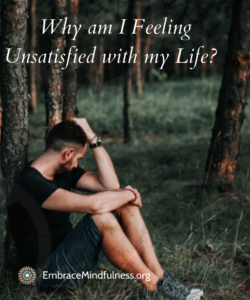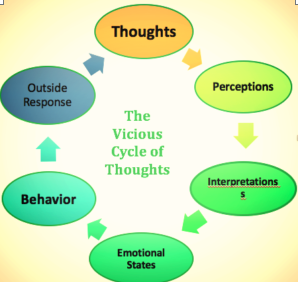Believe me, you do have more control than you think over how you feel
An old friend I had not seen for over 20 years called me last week. It was wonderful to catch up and share the different paths our lives have taken.
Unfortunately, the turmoil he has experienced regarding his relationships has sunk him into deep anxiety and depression.
 He has not spoken to one of his siblings for over 3 years, he feels unfulfilled in his job and complains about his controlling boss. He is also in the process of divorcing his wife.
He has not spoken to one of his siblings for over 3 years, he feels unfulfilled in his job and complains about his controlling boss. He is also in the process of divorcing his wife.
The key question that arose for him in our conversation was “Why am I feeling so unsatisfied with my life?”
Relationships are where we are most challenged in life. And where the greatest emotional and spiritual growth can occur.
Everything, including our relationships, does not just happen by accident in our lives. Every single emotional state we experience, both the joy and the suffering, is first created in our minds by a thought. Thoughts are the seeds of our perceptions, interpretations, emotions and behaviors. Our reality begins with a thought. That is how powerful thoughts are.
School has taught us how to read and write and how to excel in the sciences and mathematics. Sadly, the most important skill we need to lead a joyful and satisfying life has not found its way into the classroom yet.
And what is that skill? It is to be in charge of our thoughts and understand your emotional world . We need to learn the impact that our thinking patterns have in how we feel towards our lives and the lives of others. And in every one of our relationships.
We have been given an amazing gift: the capacity to create. Every original idea, every piece of art, every scientific experiment, every adventure starts in our minds.
Clearly, thoughts can be the source of amazing inspiration and innovation. They can also be the root of despair, negativity and even violence. Granted, you are not responsible for the thoughts that come to your mind, but you are responsible for either dwelling on them or bringing conscious awareness to them.
How can you harness the healing power of your mind?
The first step is to bring awareness to your thinking. You will soon notice that your mind never stops talking. It likes to linger either in past events or speculate about the future. And you soon leave the “Now” moment.
Much of what the mind says is redundant, repetitive, superficial and even damaging. It replays messages again and again even years after the event happened. And the most amazing thing is, you believe those messages as if they were true.
You may feel like a victim, and adopt an identity that will color every aspect of your life. Your mind becomes noisy with discontent with criticism and judgement. You start arguing with what IS.
There is a part of you that wants to get rid of the voice in your head. Yet there is another part of you that does not want to be free because it has become an addictive pattern. It is a pervasive kind of pleasure.
Very often, especially during meditation, you become aware of your overactive mind. The voice in your head becomes louder. Many uninvited thoughts start visiting you.
As Eckhart Tolle, the famous spiritual teacher and author of The New Earth, says “The moment you start watching your thoughts, a higher level of consciousness becomes activated.”
Most of the time, you may be so involved with your thoughts, that you do not notice your unconscious thinking patterns. You follow the thoughts. You become one with them so you cannot not see them as separate from you.
When you are totally trapped in your thinking mind, you interpret everything that is happening around you through the filter of your thoughts.
When you start raising your conscious awareness, you notice that your mind never stops. It is in that moment that you are developing the ability to observe your mind.
At that moment, you can see that your perception of your reality can create your experience. It is your choice: either compassion, gratitude and joy or unhappiness, scarcity, sadness, depression, despair.
When you shine the light of awareness on your thinking process, you can see clearly. You can stay locked in this unconscious thinking or becoming free from it.
The question then becomes: Do I want to continue with this thinking pattern for the rest of my existence or do I want to change and experience life in a different way?
Do not believe every thought that comes to your mind. Question and challenge your thoughts. Byron Katie in her book Loving What Is, shares her four key questions to confront a thought and change your life:
- Is this thought true?
- Can I be absolutely sure it is true?
- How do I react or feel when I believe this thought?
- Who would I be without that thought?
The voices inside your head create a vicious cycle from which it is very hard to escape without conscious awareness. This cycle goes like this:
 Your thoughts lead to perceptions and interpretations which trigger an emotional state. That emotion will shape your behavior and elicit the response from outside that will confirm your original thoughts.
Your thoughts lead to perceptions and interpretations which trigger an emotional state. That emotion will shape your behavior and elicit the response from outside that will confirm your original thoughts.
When you understand this cycle, you will see that by learning to monitor your thoughts you can transform not only your relationships but your whole life as well.
I invite you to listen to this talk where I address how your thoughts can create detrimental emotions which can soon become addictive, and what to do about it.
With much gratitude,
Monica
Leave a Reply